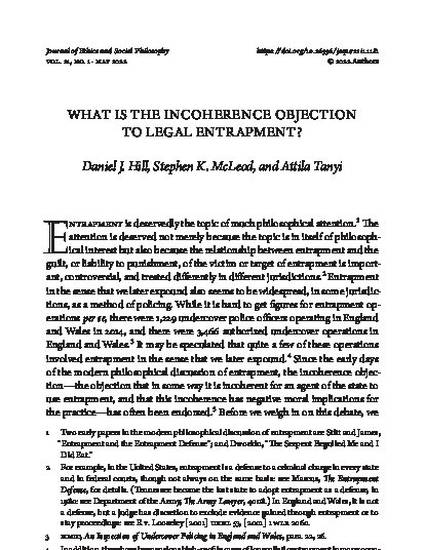
Article
What is the Incoherence Objection to Legal Entrapment?
Journal of Ethics and Social Philosophy
(2022)
Abstract
Some legal theorists say that legal entrapment to commit a crime is incoherent. So far, there is no satisfactorily precise statement of this objection in the literature: it is obscure even as to the type of incoherence that is purportedly involved. (Perhaps consequently, substantial assessment of the objection is also absent.) We aim to provide a new statement of the objection that is more precise and more rigorous than its predecessors. We argue that the best form of the objection asserts that in attempting to entrap, law enforcement [SG1] agents lapse into a form of practical incoherence that involves the attempt simultaneously to pursue contrary ends. We then argue that the objection, in this form, encompasses all cases of legal entrapment only if it is supplemented by appeal to the premise that law enforcement agents have an absolute duty never to create crimes.
Some legal theorists say that legal entrapment to commit a crime is incoherent. So far, there is no satisfactorily precise statement of this objection in the literature: it is obscure even as to the type of incoherence that is purportedly involved. (Perhaps consequently, substantial assessment of the objection is also absent.) We aim to provide a new statement of the objection that is more precise and more rigorous than its predecessors. We argue that the best form of the objection asserts that, in attempting to entrap, law-enforcement agents lapse into a form of practical incoherence that involves the attempt simultaneously to pursue contrary ends. We then argue that the objection, in this form, encompasses all cases of legal entrapment only if it is supplemented by appeal to the premise that law-enforcement agents have an absolute duty never to create crimes.@font-face {font-family:"Cambria Math"; panose-1:2 4 5 3 5 4 6 3 2 4; mso-font-charset:0; mso-generic-font-family:roman; mso-font-pitch:variable; mso-font-signature:-536870145 1107305727 0 0 415 0;}@font-face {font-family:Calibri; panose-1:2 15 5 2 2 2 4 3 2 4; mso-font-charset:0; mso-generic-font-family:swiss; mso-font-pitch:variable; mso-font-signature:-469750017 -1073732485 9 0 511 0;}p.MsoNormal, li.MsoNormal, div.MsoNormal {mso-style-unhide:no; mso-style-qformat:yes; mso-style-parent:""; margin-top:0cm; margin-right:0cm; margin-bottom:8.0pt; margin-left:0cm; line-height:107%; mso-pagination:widow-orphan; font-size:11.0pt; font-family:"Calibri",sans-serif; mso-ascii-font-family:Calibri; mso-ascii-theme-font:minor-latin; mso-fareast-font-family:Calibri; mso-fareast-theme-font:minor-latin; mso-hansi-font-family:Calibri; mso-hansi-theme-font:minor-latin; mso-bidi-font-family:"Times New Roman"; mso-bidi-theme-font:minor-bidi; mso-ansi-language:EN-GB; mso-fareast-language:EN-US;}.MsoChpDefault {mso-style-type:export-only; mso-default-props:yes; font-size:11.0pt; mso-ansi-font-size:11.0pt; mso-bidi-font-size:11.0pt; font-family:"Calibri",sans-serif; mso-ascii-font-family:Calibri; mso-ascii-theme-font:minor-latin; mso-fareast-font-family:Calibri; mso-fareast-theme-font:minor-latin; mso-hansi-font-family:Calibri; mso-hansi-theme-font:minor-latin; mso-bidi-font-family:"Times New Roman"; mso-bidi-theme-font:minor-bidi; mso-ansi-language:EN-GB; mso-fareast-language:EN-US;}.MsoPapDefault {mso-style-type:export-only; margin-bottom:8.0pt; line-height:107%;}div.WordSection1 {page:WordSection1;}
Keywords
- contrariety of ends,
- entrapment,
- incoherence,
- integrity,
- irrationality,
- legal entrapment
Disciplines
Publication Date
2022
DOI
https://doi.org/10.26556/jesp.v22i1.1181
Citation Information
Attila Tanyi, Stephen McLeod and Daniel Hill. "What is the Incoherence Objection to Legal Entrapment?" Journal of Ethics and Social Philosophy Vol. 21 Iss. 1 (2022) p. 47 - 73 Available at: http://works.bepress.com/attila_tanyi/37/
